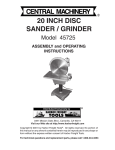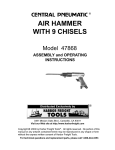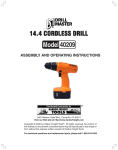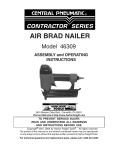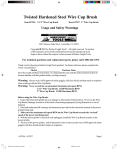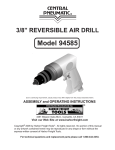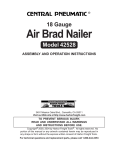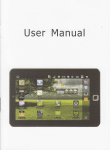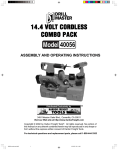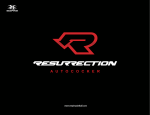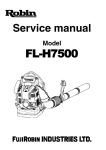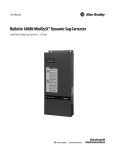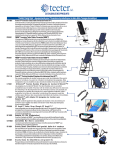Download Harbor Freight Tools 54461 User's Manual
Transcript
18 GUAGE, 5/8”-2” AIR BRAD NAILER Model 54461 ASSEMBLY and OPERATING INSTRUCTIONS ® 3491 Mission Oaks Blvd., Camarillo, CA 93011 Visit our Web site at http://www.harborfreight.com Copyright c 2003 by Harbor Freight Tools® . All rights reserved. No portion of this manual or any artwork contained herein may be reproduced in any shape or form without the express written consent of Harbor Freight Tools. For technical questions and replacement parts, please call 1-800-444-3353 54461.p65 1 10/10/03, 2:29 PM Specifications Air Inlet Recommended Air Pressure Maximum Air Pressure Nail Type Safety Feature Magazine Capacity Air Consumption Overall Dimensions 1/4”- 18 NPT 60-115 PSI 130 PSI 5/8” to 2” 18 Gauge Brads Sequential Trip Safety Trigger 110 - Side Loading Magazine 4 CFM @ 90 PSI 10” x 9-3/8” x 2-1/4” Save This Manual You will need the manual for the safety warnings and precautions, assembly instructions, operating and maintenance procedures, parts list and diagram. Keep your invoice with this manual. Write the invoice number on the inside of the front cover. Keep the manual and invoice in a safe and dry place for future reference. Safety Warnings and Precautions WARNING: When using tool, basic safety precautions should always be followed to reduce the risk of personal injury and damage to equipment. Read all instructions before using this tool! 1. Keep work area clean. Cluttered areas invite injuries. 2. Observe work area conditions. Do not use machines or power tools in damp or wet locations. Don’t expose to rain. Keep work area well lighted. Do not use electrically powered tools in the presence of flammable gases or liquids. 3. Keep children away. Children must never be allowed in the work area. Do not let them handle machines, tools, extension cords, or air hoses. 4. Store idle equipment. When not in use, tools must be stored in a dry location to inhibit rust. Always lock up tools and keep out of reach of children. 5. Use the right tool for the job. Do not attempt to force a small tool or attachment to do the work of a larger industrial tool. There are certain applications for which this tool was designed. It will do the job better and more safely at the rate for which it was intended. Do not modify this tool and do not use this tool for a purpose for which it was not intended. 6. Dress properly. Do not wear loose clothing or jewelry as they can be caught in moving parts. Protective, electrically non-conductive clothes and non-skid footwear are recommended when working. Wear restrictive hair covering to contain long hair. 7. Use eye and ear protection. Always wear ANSI approved impact safety goggles. 8. Do not overreach. Keep proper footing and balance at all times. Do not reach over or across running machines or air hoses. Page 2 SKU 54461 54461.p65 2 10/10/03, 2:29 PM 9. Maintain tools with care. Keep tools clean for better and safer performance. Follow instructions for lubricating and changing accessories. Inspect tool cords and air hoses periodically and, if damaged, have them repaired by an authorized technician. The handles must be kept clean, dry, and free from oil and grease at all times. 10. Disconnect air supply. Disconnect air hose when not in use. 11. Remove adjusting keys and wrenches. Check that keys and adjusting wrenches are removed from the tool or machine work surface before plugging it in. 12. Avoid unintentional starting. Be sure your finger is off the trigger when not in use and before plugging in. Do not carry any tool with your finger on the trigger, whether it is plugged in or not. 13. Stay alert. Watch what you are doing, use common sense. Do not operate any tool when you are tired. 14. Check for damaged parts. Before using any tool, any part that appears damaged should be carefully checked to determine that it will operate properly and perform its intended function. Check for alignment and binding of moving parts; any broken parts or mounting fixtures; and any other condition that may affect proper operation. Any part that is damaged should be properly repaired or replaced by a qualified technician. Do not use the tool if the trigger does function properly. 15. Guard against electric shock. Prevent body contact with grounded surfaces such as pipes, radiators, ranges, and refrigerator enclosures. 16. Replacement parts and accessories. When servicing, use only identical replacement parts. Use of any other parts will void the warranty. 17. Do not operate tool if under the influence of alcohol or drugs. Read warning labels if taking prescription medicine to determine if your judgement or reflexes are impaired while taking drugs. If there is any doubt, do not operate the Nailer. 18. Use proper size and type extension cord. If an extension cord is required, it must be of the proper size and type to supply the correct current to the tool without heating up. Otherwise, the extension cord could melt and catch fire, or cause electrical damage to the tool. Check your air compressor’s manual for the appropriate size cord. 19. Maintenance. For your safety, maintenance should be performed regularly by a qualified technician. 20. Compressed air only. Never use combustible gases as a power source. Note: Performance of the air compressor (if powered by line voltage) may vary depending on variations in local line voltage. Extension cord usage may also affect tool performance. Warning: The warnings, cautions, and instructions discussed in this instruction manual cannot cover all possible conditions and situations that may occur. It must be understood by the operator that common sense and caution are factors which cannot be built into this product, but must be supplied by the operator. Page 3 SKU 54461 54461.p65 3 10/10/03, 2:29 PM WARNING: Some dust created by power sanding, sawing, grinding, drilling, and other construction activites, contain chemicals known [to the State of California] to cause cancer, birth defects or other reproductive harm. some examples of these chemicals are: Lead from lead-based paints Crystalline cilica from bricks and cement or other masonry products Arsenic and chromium from chemically treated lumber (California Health & Safety Code 25249.5, et seq. ) Unpacking When unpacking, check to make sure the parts listed on page 8 are included. If any parts are missing or broken, please call Harbor Freight Tools at the number on the cover of this manual as soon as possible Operation 1/4” -18 NPT Nailer For best service you should incorporate an oiler, regulator, and inline filter, as shown in the diagram above. Hoses, couplers, oilers, regulators, and filters are all available at Harbor Freight Tools. 1. You will need to prepare a 1/4” air connector (sold separately) to connect to the Air Inlet (33) (See FIGURE 1) on the Nailer. First, wrap the 1/4” air connector (not included) with pipe thread seal tape before connecting to the Air Inlet (33). Connect the Air Source Hose to the Air Connector (not included). Note: If you are not using an automatic oiler system on your air compressor, before operation, add a few drops of Pneumatic Tool Oil to the airline connection. Add a few drops more after each hour of continual use. 2. Set the air pressure on your compressor to between 60 and 115 PSI. Do not exceed the maximum air pressure of 130 PSI. 3. Check the air connection for leaks. Warning! Disconnect the Nailer from the air compressor whenever loading or servicing. After disconnecting the Nailer from the air compressor, there could still be enough air pressure to fire the Nailer. Always fire the trigger repeatedly to make sure all of the air is expended. Page 4 SKU 54461 54461.p65 4 10/10/03, 2:29 PM FIGURE 1 1/4” Air Inlet (33) Trigger (31) Magazine Latch (39) Heel Cushion (79) Seqential Trip Safety Warning! This Nailer has a Sequential Trip safety mechanism. With the trigger pulled, the unit will fire each time the nose of the Nailer contacts a surface. This Nailer is not suited for single shot work. Vibration and bouncing and delayed finger pressure will commonly result in the unit double firing. Testing the Sequential Trip Safety Mechanism (Always test while using scrap material.) 1. The Nailer should not fire if the nose is not depressed against the workpiece. 2. Make sure the tool is disconnected from the power supply. 3. Empty the magazine of nails. 4. Check that the Trigger (31) and the nose of the tool, moves freely, without sticking. 5. Connect the air supply to the tool at the Air Inlet (33) and set at the recommended 60-115 PSI, and not over the maximum 130 PSI. 6. Test the tool by depressing the nose of the tool against the workpiece without pulling the Trigger (31). The tool must not cycle (fire). If it cycles (fires), stop immediately and take the tool to an qualified service technician for repair. 7. Hold the tool away or off of the workpiece. The nose of the tool should return to its original position. Squeeze the Trigger (31). The tool should not cycle (fire). If it cycles (fires), stop immediately and take the tool to an authorized service technician. 8. Depress the nose of the tool against the workpiece and squeeze the Trigger (31). The tool must cycle (fire). If it fails to cycle (fire), take it to an authorized service technician. Page 5 SKU 54461 54461.p65 5 10/10/03, 2:29 PM Loading Nails Always disconnect the Brad Nailer from the air source before loading nails. 1. While pushing on the Magazine Latch (39) with your right thumb, push on the Heel Cushion (79) with your left thumb, and pull back to open the magazine. See FIGURE 1. 2. Insert the brads. 3. Snap the Heel Cushion (79) back into position. Operating the Nailer 1. Attach the Nailer to the air supply at the Air Connector (not included) which is already connected to the Air Inlet (33). See FIGURE 1. Start your compressor and make sure it is set to between the recommended 60-115 PSI and not over the maximum 130 PSI. 2. To fire, place the nose of the Nailer on the workpiece. The Nailer should not fire if the nose is not depressed. Once depressed, gently squeeze the Trigger (31) once. Do not fire repeatedly; nails could bounce off of one another causing injury. 3. To adjust the driven depth of the brads, use the pressure regulator on the compressor. 4. When finished with nailing, disconnect the tool from the air hose. Clearing Jams 1. Disconnect tool from air hose. Always fire the trigger repeatedly to make sure all of the air is expended from the Nailer. 2. If a nail is jammed in the discharge area, simply remove it with pliers. 3. If a nail is jammed in the magazine, while pushing on the Magazine Latch (39) with your right thumb, push on the Heel Cushion (79) with your left thumb, and pull back to open the magazine. Remove all of the Brads. Snap the Heel Cushion (79) back into place. See FIGURE 1. Warning! After disconnecting the Nailer from the compressor, there could still be enough air pressure to fire the Nailer. Always fire the trigger repeatedly to make sure all the air is expended. Maintenance Warning! Always disconnect the tool from the air compressor and then empty the magazine of nails before attempting to inspect or perform maintenance to the Nailer. 1. Inspect all of the nuts and screws and make sure they are securely fastened. 2. Periodically lubricate the driving mechanism and magazine with a light oil. Wipe down with a clean cloth. Never use gasoline or flammable solvents to clean the tool. 3. Inspect your air compressor according to manufacturer’s instructions. Warning! If you detect any air leaks, power loss, the Nailer skips driving, drives too deep, or not deep enough, take the Nailer to a qualified service technician. Page 6 SKU 54461 54461.p65 6 10/10/03, 2:29 PM Troubleshooting Warning! If you detect any air leaks, power loss, the Nailer skips driving, drives too deep, or not deep enough, take the Nailer to a qualified service technician for repair. Note: Have the following problems repaired by a qualified service technician. 1. Problem: Air leaking at trigger valve area. Probable Cause: Damaged 0-rings in trigger valve housing. Solution: Replace 0-rings. Then re-check contact safety trip mechanism. 2. Problem: Air leaking between housing and nose. Probable Cause: Loose screws in housing, damaged 0-rings or bumper. Solution: Tighten screws or replace 0-rings or bumper. 3. Problem: Air leaking between housing and cap. Probable Cause: Loose screws or damaged gasket. Solution: Tighten Screws or replace gasket. 4. Problem: Runs slowly or has power loss. Probable Cause: Nailer insufficiently oiled, broken spring in cylinder cap, exhaust part in cap is blocked. Solution: Lubricate moving parts (Magazine, Nose, and Trigger assemblies), install new spring, Replace damaged internal parts. 5. Problem: Nailer skips driving nails. Probable Cause: Worn or dirty bumper, damaged pusher spring, inadequate air flow, worn or dry 0-ring on piston, damaged 0-ring on trigger valve, cap gasket leaking. Solution: Replace bumper or pusher spring, clean bumper and drive channel, check fittings, replace or lubricate 0-rings, replace gasket. 6. Problem: Nails are jammed in Nailer nose. Probable Cause: Guide on driver is worn. Wrong size or damaged Brads, loose magazine or nose screws, damaged driver. Solution: Replace guide, use recommended, undamaged Brads, tighten screws, replace driver. 7. Problem: Nail will not drive down tight. Probable Cause: Insufficient air pressure, rounded driver blade causing slippage, power loss, slow cycling and power loss. Solution: Adjust air pressure, replace blade, check spring under cap for broken coils or reduce length, check if cap in exhaust port is restricted. 8. Problem: Driving Brad too deeply. Probable Cause: Worn bumper or piston spacer. Solution: Replace either or both parts. Warning! Disconnect the Nailer from the air compressor whenever loading or servicing. After disconnecting the Nailer from the air compressor, there could still be enough air pressure to fire the Nailer. Always fire the trigger repeatedly to make sure all of the air is expended. Page 7 SKU 54461 54461.p65 7 10/10/03, 2:29 PM Parts List Part No. 1 2* 3* 4* 5* 6* 7* 8* 9* 10* 11* 12 13* 14 15 16 17 18 19 20 21* 22* 23* 24* 25* 26* 27* 28* 29* 30* 31* 32* 33 34 35 36 Description Cylinder Cap Cover Screw Exhaust Deflector Air Seal Spring Cylinder Cap 0-ring 0-ring 0-ring Firing Valve Piston 0-ring Sleeve Retainer Cylinder Sleeve Piston Stop 0-ring Trigger Pin Main Body Driver Bushing Handle 0-ring 0-ring Rubber Remote Hsng. Conical Spring 0-ring Remote Core Remote Housing 0-ring Extension Spring Set Trigger Guide Pin Bushing Trigger Pin Air Inlet 1/4” Pin Retainer Screw Serial Label Part No. 37 38 39 40 41 42 43 44* 45* 46* 47* 48* 49* 50* 51* 52* 53* 54* 55* 56* 57* 58* 59* 60* 61* 62* 63* 64* 65* 66* 67* 68* 69* 70* Description Exhaust Cover Muffler Magazine Latch Latch Spring Latch Pin Pin Retaner Safety Pin Safety Guide Plate Safety Pin Safety Spring E-ring Safety Adjs. Wheel Upper Safety Element 0-ring Safety Contact Pin 0-ring Main Piston Piston Drv. Coupling Inner Spring Pin Outer Spring Pin Driver Blade Screw Washer Safety Cover Lower Safety Element Front Plate Spring Pin Screw Fixed Backplate Screw Screw Washer Moving Backplate Feeder Shoe Part No. 71* 72* 73* 74* 75* 76* 77* 78* 79 80* 81* 82* 83* 84* 85 86 87* 88* 89* 90* 91* 92* 93* 94* 95* 96* 97* 98* 99* 100* 101 Description Spring Holder Screw Magazine Support Nylok Screw Magazine Stop Fixed Rail Wear Strip Feeder Spring Mag. Heel Cushion Screw Latch Plate Moving Rail Spacer Stopper Grip Warning Decal Screw Logo Plate Cylinder Cap Assy. Head Vlv. Piston Set Cylinder Set Trigger Valve Set Trigger Set Release Catch Assy. Piston Set Screw Set Screw Screw Screw Cylinder Cap Assy. Duster B0300-070 Cylinder Set B11001221 Magazine Set * The parts with asterisks cannot be purchased separately. They may be purchased as part of a set as denoted below: Set # B0300-070 includes 2,3,4,5,87,89,6,100,7,8,9,10,90,11/ Set #91 includes 9,11,13/ Set #92 includes 21,22,23,24,25,26,27 / Set #93 includes 28,29,30,31,32 / Set #94 includes 44,45,46,47,48,49,50,51 / Set #95 includes 52,53,54,55,56,57/ Set #96 includes 58,59/ Set #97 includes 66,68/ Set #98 includes 67,68/ Set#99 includes 72,59/ Set B11001-221 includes 73,65,64,63,62,61,60,97,66,68,98,63,64,69,84,70,71,74,75,76,77,78,80,81,82 PLEASE READ THE FOLLOWING CAREFULLY THE MANUFACTURER AND/OR DISTRIBUTOR HAS PROVIDED THE PARTS DIAGRAM IN THIS MANUAL AS A REFERENCE TOOL ONLY. NEITHER THE MANUFACTURER NOR DISTRIBUTOR MAKES ANY REPRESENTATION OR WARRANTY OF ANY KIND TO THE BUYER THAT HE OR SHE IS QUALIFIED TO MAKE ANY REPAIRS TO THE PRODUCT OR THAT HE OR SHE IS QUALIFIED TO REPLACE ANY PARTS OF THE PRODUCT. IN FACT, THE MANUFACTURER AND/OR DISTRIBUTOR EXPRESSLY STATES THAT ALL REPAIRS AND PARTS REPLACEMENTS SHOULD BE UNDERTAKEN BY CERTIFIED AND LICENSED TECHNICIANS AND NOT BY THE BUYER. THE BUYER ASSUMES ALL RISK AND LIABILITY ARISING OUT OF HIS OR HER REPAIRS TO THE ORIGINAL PRODUCT OR REPLACEMENT PARTS THERETO, OR ARISING OUT OF HIS OR HER INSTALLATION OF REPLACEMENT PARTS THERETO. NOTE: Some parts are listed and shown for illustration purposes only and are not available individually as replacement parts. Page 8 SKU 54461 54461.p65 8 10/10/03, 2:29 PM Assembly Drawing 100 90 91 14 11 13 12 9 93 11 10 B0300-070 89 8 9 7 4 87 5 6 3 1 2 92 32 31 30 29 28 27 26 24 25 24 23 22 21 20 19 18 36 16 17 15 97 66 68 58 59 43 42 33 94 101 67 60 51 50 49 48 47 46 45 44 68 98 34 96 61 41 38 62 63 63 64 37 95 64 85 83 69 57 56 55 65 52 54 53 35 84 70 40 71 39 86 99 59 72 73 B1100-1221 82 81 79 78 77 76 75 74 Page 9 SKU 54461 54461.p65 80 9 10/10/03, 2:30 PM









